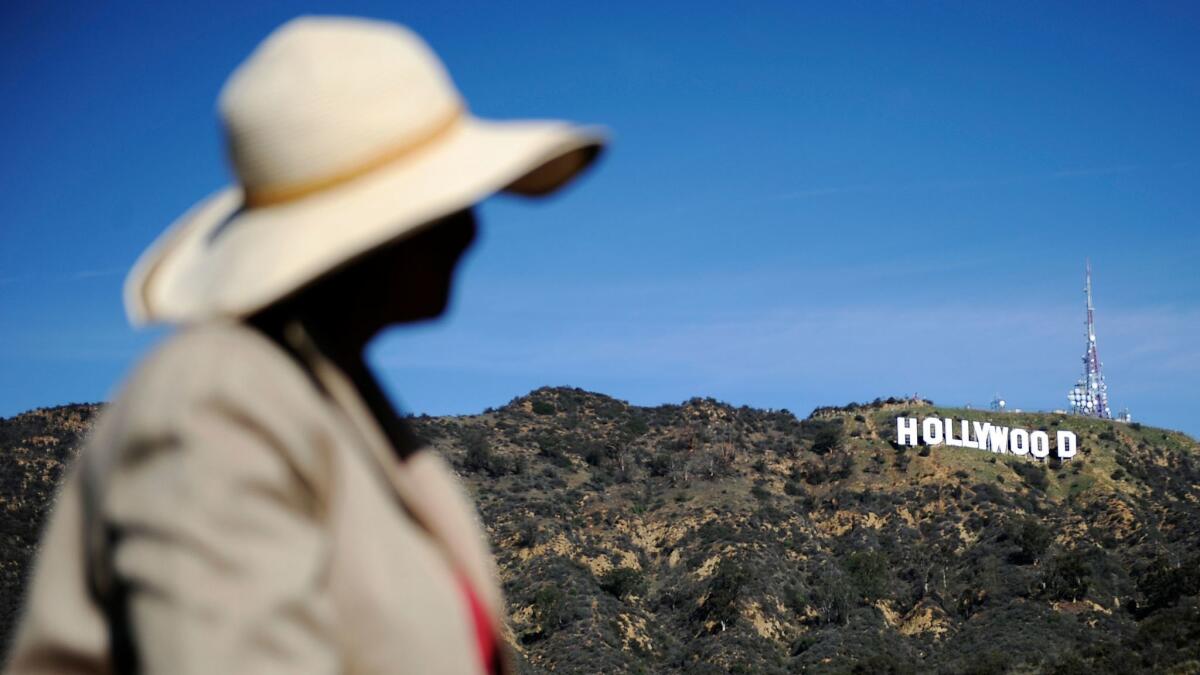Editorial: City leaders should be fighting for more access to Griffith Park and Hollywood sign, not less

- Share via
Imagine the outcry if the city of Paris closed the roads leading to the Eiffel Tower or if San Francisco blocked pedestrians from walking the crooked Lombard Street. Likewise, public-access advocates are rightfully upset that, to resolve a lawsuit, the city of Los Angeles has permanently closed the gate at the top of Beachwood Drive that provides the easiest way to get to the Hollywood sign in Griffith Park. Now another lawsuit, filed this week, seeks to force the city to reopen the trailhead.
The Department of Recreation and Parks locked the Beachwood gate on April 18 after a judge ruled that the city had effectively overcrowded an easement into the Sunset Ranch Hollywood Stables, which is located on private land inside Griffith Park. The city had channeled some 15,000 hikers a month onto the easement, making it difficult for deliveries and employees to reach the stables. City security guards posted at the Beachwood gate had also turned away stable customers.
The judge said that was unacceptable and that the city should create a new trailhead as close to the Beachwood gate as practicable. The city’s response, however, was to permanently close the gate, forcing hikers and selfie-seeking tourists to find new ways to approach the sign.
Needless to say, they’re not happy; alternative routes are farther away. Public-access advocates also warn that the Beachwood closure sets a worrisome precedent in which aggrieved businesses and neighbors can sue or pressure the city to close trailheads and make it harder for Angelenos and others to access Griffith Park.
Permanently closing a trailhead should be the last resort.
On Monday, several groups sued the city in an attempt to reverse the Beachwood closure. They include the nonprofit Friends of Griffith Park; the heirs of Colonel Griffith J. Griffith (who donated the land for the original park); and the Los Feliz Oaks Homeowners Assn., whose members will see more hikers and traffic now that the Beachwood gate is closed. The lawsuit argues that the city’s decision to permanently close the gate denies reasonable access to public land and is, in effect, a gift of public land to the private Sunset Ranch stable.
The groups’ concerns are legitimate: There is a tremendous demand for access to the Hollywood sign and to Griffith Park trails, both of which sit on public property. But businesses and residents near the Hollywood sign also have legitimate gripes. The Hollywood sign attracts throngs of tourists and hikers to narrow hillside streets. The city has enacted parking restrictions and beefed up traffic enforcement, but the problems persist.
However, permanently closing a trailhead should be the last resort — and even then, when one entry closes, another should be opened in a convenient location. City leaders and the city attorney should be fighting for more public access, not less.
The battles over access to the park will continue until the city develops a comprehensive plan for trails, bike paths, parking and shuttles that ensures visitors have ample ways to get safely to the sign and the park. Councilman David Ryu, whose district includes Griffith Park and many of the surrounding neighborhoods, announced plans for a $100,000 public-access study. The goal, Ryu’s aides said, is to finally come up with a long-term solution that gives tourists a good view of the sign, gives hikers good access to trails and gives residents some relief from the visitor traffic.
Any plan must make public access the top priority, otherwise it will not work. The Hollywood Sign is a renowned city landmark, and Griffith Park is L.A.’s Central Park. They must be open and accessible to all.
Follow the Opinion section on Twitter @latimesopinion and Facebook
More to Read
A cure for the common opinion
Get thought-provoking perspectives with our weekly newsletter.
You may occasionally receive promotional content from the Los Angeles Times.









